综合英语教程第三册11单元3-11-Part 3
全新版大学英语综合教程3各单元summary课本原文及翻译
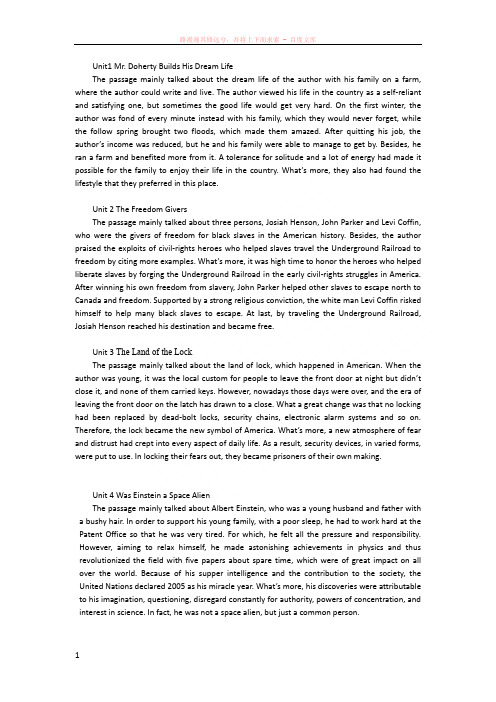
Unit1 Mr. Doherty Builds His Dream LifeThe passage mainly talked about the dream life of the author with his family on a farm, where the author could write and live. The author viewed his life in the country as a self-reliant and satisfying one, but sometimes the good life would get very hard. On the first winter, the author was fond of every minute instead with his family, which they would never forget, while the follow spring brought two floods, which made them amazed. After quitting his job, the author’s income was reduced, but he and his family were able to manage to get by. Besides, he ran a farm and benefited more from it. A tolerance for solitude and a lot of energy had made it possible for the family to enjoy their life in the country. What’s more, they also had found the lifestyle that they preferred in this place.Unit 2 The Freedom GiversThe passage mainly talked about three persons, Josiah Henson, John Parker and Levi Coffin, who were the givers of freedom for black slaves in the American history. Besides, the author praised the exploits of civil-rights heroes who helped slaves travel the Underground Railroad to freedom by citing more examples. What’s more, it was high time to honor the heroes who helped liberate slaves by forging the Underground Railroad in the early civil-rights struggles in America. After winning his own freedom from slavery, John Parker helped other slaves to escape north to Canada and freedom. Supported by a strong religious conviction, the white man Levi Coffin risked himself to help many black slaves to escape. At last, by traveling the Underground Railroad, Josiah Henson reached his destination and became free.Unit 3 The Land of the LockThe passage mainly talked about the land of lock, which happened in American. When the author was young, it was the local custom for people to leave the front door at night but didn’t close it, and none of them carried keys. However, nowadays those days were over, and the era of leaving the front door on the latch has drawn to a close. What a great change was that no locking had been replaced by dead-bolt locks, security chains, electronic alarm systems and so on. Therefore, the lock became the new symbol of America. What’s more, a new atmosphere of fear and distrust had crept into every aspect of daily life. As a result, security devices, in varied forms, were put to use. In locking their fears out, they became prisoners of their own making.Unit 4 Was Einstein a Space AlienThe passage mainly talked about Albert Einstein, who was a young husband and father with a bushy hair. In order to support his young family, with a poor sleep, he had to work hard at the Patent Office so that he was very tired. For which, he felt all the pressure and responsibility. However, aiming to relax himself, he made astonishing achievements in physics and thus revolutionized the field with five papers about spare time, which were of great impact on all over the world. Because of his supper intelligence and the contribution to the society, the United Nations declared 2005 as his miracle year. What’s more, his discoveries were attributable to his imagination, questioning, disregard constantly for authority, powers of concentration, and interest in science. In fact, he was not a space alien, but just a common person.Unit 5 Three Thank-You LettersThe passage mainly talked about the author’s three special letters, by which he wanted to celebrate the true meaning of Thanksgiving. On Thanksgiving Day 1943, as a young coastguardsman at sea, he worked as a cook. While he was going to think about Thanksgiving, he came up with the idea of expressing his gratitude to people who had helped him before. Therefore, he wrote three thank-you letters to three persons, his father, the Rev. Nelson and his grandmother. At a mail call, he got three letters in reply, which drove him to think deeply. After he retired from the Coast Guard, he still never forgot these letters which gave him an insight into expressing appreciation for one’s efforts. Furthermore, he wished everyone to find the good and then praise it.Unit 6 The Last LeafThe passage mainly talked about the last leaf, which Johnsy gave a sight to after she got the pneumonia and lived in the hospital. She looked out the window and counted the leaves on an old ivy vine. Furthermore, she made up her mind to end her life when the last leaf fell. When she saw the last leaf still cling to the vine after two nights’ rain and wind, she decided not to give up her life. In fact, the last leaf, called a masterpiece by Behrman who risked his life painting it there the night that the last leaf fell, was actually painted onto the wall. However, because it looked so real that she could have never imagined that it was faked. In a deeper sense, it saved her life.unit 1 Mr. Doherty Builds His Dream LifeIn America many people have a romantic idea of life in the countryside. Many living in towns dream of starting up their own farm, of living off the land. Few get round to putting their dreams into practice. This is perhaps just as well, as the life of a farmer is far from easy, as Jim Doherty discovered when he set out to combine being a writer with running a farm. Nevertheless, as he explains, he has no regrets and remains enthusiastic about his decision to change his way of life.在美国,不少人对乡村生活怀有浪漫的情感。
综合英语3Unit11

Audiovisual Supplement
Cultural Information
Audiovisual Supplement
Cultural Information
Miss Johnson: Well, if you all feel that strongly about it, leave the room. Student A: What? Miss Johnson: Hey, listen! Nobody’s forcing you to be here. You have a choice. You can stay, or you can leave. Student B: Lady, why are you playing this game? We don’t have a choice. Miss Johnson: You don’t have a choice? You don’t have a choice on whether or not you’re here? Student B: No! If we leave, we don’t get to graduate. If we stay, we gotta put up with you. Miss Johnson: That’s a choice, isn’t it? You have a choice. You either don’t graduate or you have to put up with me. It may not be a choice you like, but it is a choice.
Audiovisual Supplement
Cultural Information
大学英语专业综合教程第三册Unit11课文及单词
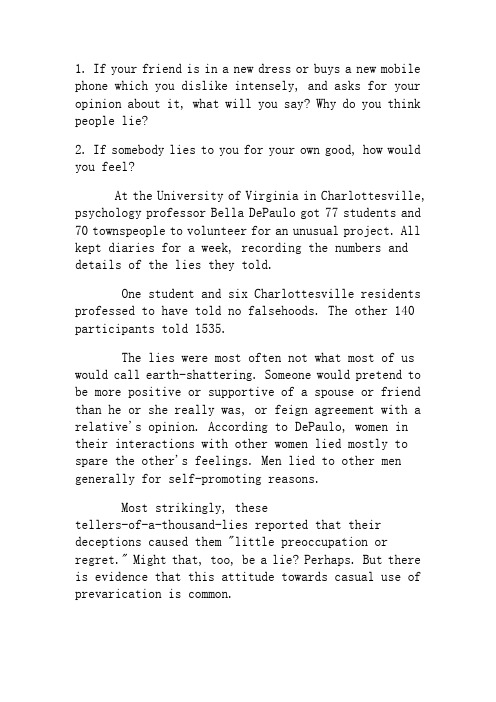
1. If your friend is in a new dress or buys a new mobile phone which you dislike intensely, and asks for your opinion about it, what will you say? Why do you think people lie?2. If somebody lies to you for your own good, how would you feel?At the University of Virginia in Charlottesville, psychology professor Bella DePaulo got 77 students and 70 townspeople to volunteer for an unusual project. All kept diaries for a week, recording the numbers and details of the lies they told.One student and six Charlottesville residents professed to have told no falsehoods. The other 140 participants told 1535.The lies were most often not what most of us would call earth-shattering. Someone would pretend to be more positive or supportive of a spouse or friend than he or she really was, or feign agreement with a relative's opinion. According to DePaulo, women in their interactions with other women lied mostly to spare the other's feelings. Men lied to other men generally for self-promoting reasons.Most strikingly, these tellers-of-a-thousand-lies reported that their deceptions caused them "little preoccupation or regret." Might that, too, be a lie? Perhaps. But there is evidence that this attitude towards casual use of prevarication is common.For example, 20,000 middle-and high-schoolers were surveyed by the Josephson Institute of Ethics — anonprofit organization in Marina del Rey, California, devoted to character education. Ninety-two per cent of the teenagers admitted having lied to their parents in the previous year, and 73 per cent characterized themselves as "serial liars," meaning they told lies weekly. Despite these admissions, 91 per cent of all respondents said they were "satisfied with my own ethics and character."Think how often we hear the expressions "I'll call you" or "The check is in the mail" or "I'm sorry, but he stepped out." And then there are professions —lawyers, pundits, public relations consultants —whose members seem to specialize in shaping or spinning the truth to suit clients' needs.Little white lies have become ubiquitous, and the reasons we give each other for telling fibs are familiar. Consider, for example, a corporate executive whom I'll call Tom. He goes with his wife and son to his mother-in-law's home for a holiday dinner every year. Tom dislikes her "special" pumpkin pie intensely. Invariably he tells her how wonderful it is, to avoid hurting her feelings."What's wrong with that?" Tom asked Michael Josephson, president of the Josephson Institute. It's a question we might all ask.Josephson replied by asking Tom to consider the lie from his mother-in-law's point of view. Suppose that one day Tom's child blurts out the truth, and she discovers the deceit. Will she tell her son-in-law, "Thank you for caring so much"? Or is she more likelyto feel hurt and say, "How could you have misled me all these years? And what else have you lied to me about?"And what might Tom's mother-in-law now suspect about her own daughter? And will Tom's boy lie to his parents and yet be satisfied with his own character?How often do we compliment people on how well they look, or express our appreciation for gifts, when we don't really mean it? Surely, these "nice lies" are harmless and well-intended, a necessary social lubricant. But, like Tom, we should remember the words of English novelist Sir Walter Scott, who wrote, "What a tangled web we weave, when first we practice to deceive."Even seemingly harmless falsehoods can have unforeseen consequences. Philosopher Sissela Bok warns us that they can put us on a slippery slope. "After the first lies, others can come more easily," she wrote in her book Lying: Moral Choice in Public and Private Life. "Psychological barriers wear down; the ability to make more distinctions can coarsen; the liar's perception of his chances of being caught may warp."Take the pumpkin-pie lies. In the first place, it wasn't just that he wanted his mother-in-law to feel good. Whether he realized it or not, he really wanted her to think highly of him. And after the initial deceit he needed to tell more lies to cover up the first one.Who believes it anymore when they're told that the person they want to reach by phone is "in a meeting"? By itself, that kind of lie is of no great consequence.Still, the endless proliferation of these little prevarications does matter.Once they've become common enough, even the small untruths that are not meant to hurt encourage a certain cynicism and loss of trust. "When [trust] is damaged," warns Bok, "the community as a whole suffers; and when it is destroyed, societies falter and collapse."Are all white lies to be avoided at all costs? Not necessarily. The most understandable and forgivable lies are an exchange of what ethicists refer to as the principle of trust for the principle of caring, "like telling children about the tooth fairy, or deceiving someone to set them up for a surprise party," Josephson says. "Still, we must ask ourselves if we are willing to give our friends and associates the authority to lie to us whenever they think it is for our own good."Josephson suggests a simple test. If someone you lie to finds out the truth, will he thank you for caring? Or will he feel his long-term trust in you has been undermined?And if you're not sure, Mark Twain has given us a good rule of thumb. "When in doubt, tell the truth. It will confound your enemies and astound your friends."New words:volunteerv. to give or offer (one's help, a suggestion, etc.) willingly or without being paidprofessv. to make a claimfeignv. to pretend to have or bepreoccupationn. the state of constantly thinking or worrying about somethingprevaricationn. the state of avoiding giving a direct answer or making a firm decisionseriala. of, in or forming a number of things, events, etc. of a similar kind, especially placed or occurring one after anotherethicsn. moral correctness; moral principlespunditn. a person who is an authority on a particular subject; an expertconsultantn. a person who gives specialist professional advice to othersfibn. a small unimportant liedeceitn. dishonest act or statementlubricantn. a substance such as oil which cause a machine to operate more easilytanglev. to make or become a mass of disordered and twisted threadswear downto reduce or become weaker until uselessperceptionn. the ability to see, hear and understand; the quality of understandingwarpv. to (cause to) turn or twist out of shapeproliferationn. a rapid increase in the amount or number of somethingcynicismn. the belief that people always act selfishlyfalterv. to lose power or strength in an uneven way, thus no longer making much progressassociaten. a person who is connected to another person as a businesspartner, colleague, or companionunderminev. to gradually make somebody or something less strong or effectiveconfoundv. to confuse and greatly surprise people, causing them to be unable to explain or deal with a situationastoundv. to make somebody very surprised or shocked, especially with (news of) something completely unexpected。
何兆熊《综合教程(3)》(第2版)学习指南-Unit 11【圣才出品】
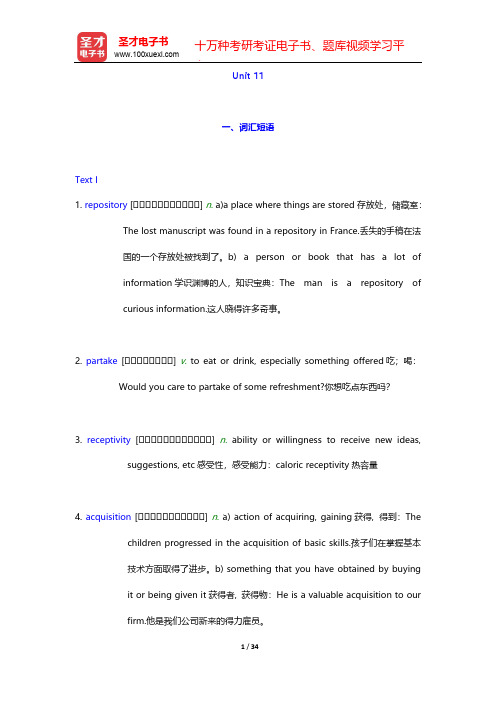
Unit 11一、词汇短语Text I1. repository [ ] n. a)a place where things are stored存放处,储藏室:The lost manuscript was found in a repository in France.丢失的手稿在法国的一个存放处被找到了。
b) a person or book that has a lot ofinformation学识渊博的人,知识宝典:The man is a repository ofcurious information.这人晓得许多奇事。
2. partake [ ]v. to eat or drink, especially something offered吃;喝:Would you care to partake of some refreshment?你想吃点东西吗?3. receptivity [ ]n. ability or willingness to receive new ideas,suggestions, etc感受性,感受能力:caloric receptivity热容量4. acquisition [ ] n. a) action of acquiring, gaining获得, 得到:Thechildren progressed in the acquisition of basic skills.孩子们在掌握基本技术方面取得了进步。
b) something that you have obtained by buyingit or being given it获得者, 获得物:He is a valuable acquisition to ourfirm.他是我们公司新来的得力雇员。
5. rigid [ ] adj. a) firm or fixed in behavior, views or methods; difficult tochange or unwilling to change严格的;死板的;不变的:While other companies may want to impose a rigid, uniform view of the world, we do not.其他公司可能会强加员工一种死板而一成不变的世界观,而我们不这么做。
大学英语综合教程3 Unit 11

•Prior : (adj.)
• Existing or arranged before the present situation ▫ You do not need any prior knowledge of the subject. ▫ Please give us prior notice if you need an evening meal.
• Not so much…as…
• One description of sth is less correct than another ▫ She was not so much nervous as impatient for the journey to be over. ▫ It’s not so much a hobby as a career(=more like a career than a hobby)
• 1.When they start school, children are curious and ready to try to explore the unknown. However, they end up losing the spirit of discovering after years of formal education. • 2.“Advanced” learners are likely to make mistakes. For example, they may become excessively satisfied with their progress or, on the contrary, put too much pressure on themselves.
• A war correspondent
新编英语教程第三册Unit11
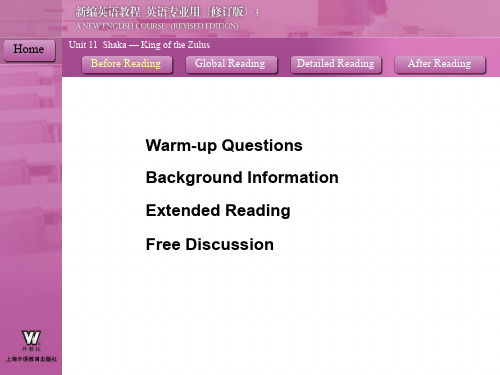
Home
Unit 11 Shaka — King of the Zulus
Before Reading
Global Reading
Detailed Reading
After Reading
Warm-up Questions
1. What kind of king was Shaka? He was most probably a cruel king.
Home
Unit 11 Shaka — King of the Zulus
Before Reading
Global Reading
Detailed Reading
After Reading
Extended Reading
Directions: Listen to the following information for a better understanding of the Zulu life. While listening, please fill in the blanks with the information you hear.
Descendants of the Nguni peoples of southeast Africa, the Zulu trace their history back to the 14th and 15th centuries when they _m_i_g_r_at_e_d_ southward and settled into modern-day South Africa. During the 1800s, under Chief Shaka, the Zulus _es_t_a_b_li_s_h_ed_ themselves as a very powerful people and were feared throughout southern Africa. During this time it was the men who wove Zulu baskets; however, as the British took the men to work in the mines, women found it necessary to learn to weave the traditional African Zulu Baskets. Zulu baskets served as functional utilitarian containers and were typically devoid of any designs or patterns.
综合英语教程(第三版)BOOK1-课文译文11.第十一单元
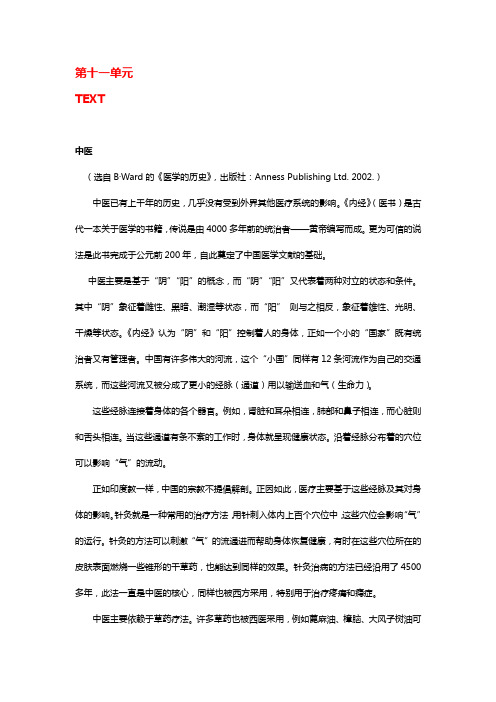
第十一单元TEXT中医(选自B·Ward的《医学的历史》,出版社:Anness Publishing Ltd. 2002.)中医已有上千年的历史,几乎没有受到外界其他医疗系统的影响。
《内经》(医书)是古代一本关于医学的书籍,传说是由4000多年前的统治者——黄帝编写而成。
更为可信的说法是此书完成于公元前200年,自此奠定了中国医学文献的基础。
中医主要是基于“阴”“阳”的概念,而“阴”“阳”又代表着两种对立的状态和条件。
其中“阴”象征着雌性、黑暗、潮湿等状态,而“阳”则与之相反,象征着雄性、光明、干燥等状态。
《内经》认为“阴”和“阳”控制着人的身体,正如一个小的“国家”既有统治者又有管理者。
中国有许多伟大的河流,这个“小国”同样有12条河流作为自己的交通系统,而这些河流又被分成了更小的经脉(通道)用以输送血和气(生命力)。
这些经脉连接着身体的各个器官。
例如,肾脏和耳朵相连,肺部和鼻子相连,而心脏则和舌头相连。
当这些通道有条不紊的工作时,身体就呈现健康状态。
沿着经脉分布着的穴位可以影响“气”的流动。
正如印度教一样,中国的宗教不提倡解剖。
正因如此,医疗主要基于这些经脉及其对身体的影响。
针灸就是一种常用的治疗方法,用针刺入体内上百个穴位中,这些穴位会影响“气”的运行。
针灸的方法可以刺激“气”的流通进而帮助身体恢复健康,有时在这些穴位所在的皮肤表面燃烧一些锥形的干草药,也能达到同样的效果。
针灸治病的方法已经沿用了4500多年,此法一直是中医的核心,同样也被西方采用,特别用于治疗疼痛和瘾症。
中医主要依赖于草药疗法。
许多草药也被西医采用,例如蓖麻油、樟脑、大风子树油可以用来治疗麻风病,铁可以治疗贫血。
众所周知,人参是中国的兴奋剂,用后可使人精力旺盛。
古代的中国人还发明了接种疫苗的方法用以治疗天花。
他们从天花中提取的少量脓汁注射到健康的人体内,使之产生轻微的疾病症状进而对深度感染形成免疫力。
欧洲直到公元1700年才发现了接种疫苗的方法。
Unit-11-On-Becoming-a-Better-Student课文翻译综合教程三
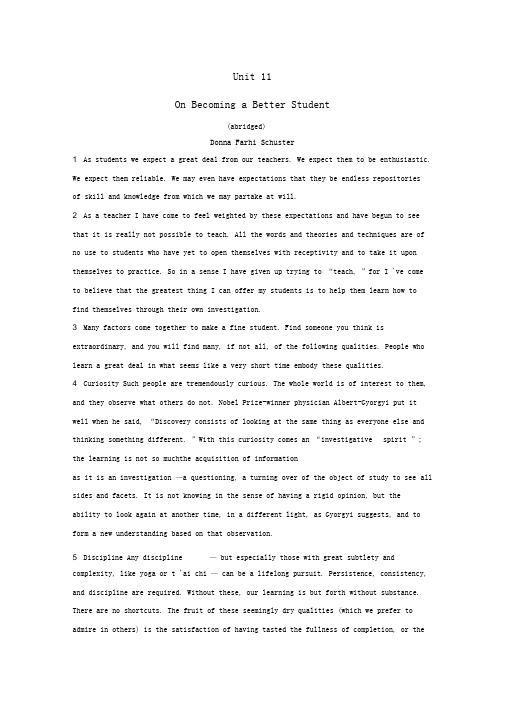
Unit 11On Becoming a Better Student(abridged)Donna Farhi Schuster1 As students we expect a great deal from our teachers. We expect them to be enthusiastic. We expect them reliable. We may even have expectations that they be endless repositoriesof skill and knowledge from which we may partake at will.2 As a teacher I have come to feel weighted by these expectations and have begun to see that it is really not possible to teach. All the words and theories and techniques are of no use to students who have yet to open themselves with receptivity and to take it upon themselves to practice. So in a sense I have given up trying to “teach, ”for I 've cometo believe that the greatest thing I can offer my students is to help them learn how tofind themselves through their own investigation.3 Many factors come together to make a fine student. Find someone you think is extraordinary, and you will find many, if not all, of the following qualities. People who learn a great deal in what seems like a very short time embody these qualities.4 Curiosity Such people are tremendously curious. The whole world is of interest to them, and they observe what others do not. Nobel Prize-winner physician Albert-Gyorgyi put it well when he said, “Discovery consists of looking at the same thing as everyone else and thinking something different. ”With this curiosity comes an “investigative spirit ”; the learning is not so muchthe acquisition of informationas it is an investigation —a questioning, a turning over of the object of study to see all sides and facets. It is not knowing in the sense of having a rigid opinion, but theability to look again at another time, in a different light, as Gyorgyi suggests, and to form a new understanding based on that observation.5 Discipline Any discipline —but especially those with great subtlety and complexity, like yoga or t 'ai chi —can be a lifelong pursuit. Persistence, consistency, and discipline are required. Without these, our learning is but forth without substance. There are no shortcuts. The fruit of these seemingly dry qualities (which we prefer to admire in others) is the satisfaction of having tasted the fullness of completion, or thethrill of meeting a difficult challenge with success. Perhaps, though, our culture is in need of redefining what it means to study. If we can look at our chosen discipline or craft as an ongoing process rather than as a discrete accomplishment, the potential for learning can be infinite. With this attitude we may find ourselves treating even the most mundane discovery with wide-eyed wonder and joy.6 Risk-Taking Whyis it, then, that so few people live up to their true potential? Beyond the well-paved roads and secure structures we usually build for ourselves lie demons, unsure footing —and unfelt pleasures. To be a student is to take risks. Yet most education discourages people from venturing far enough to take risks to make mistakes.“Children enter school as question marks and leave as periods, ”observes educator Neil Postman. What kind of punctuation mark do you represent? Do youfind yourself looking for tidy answers that give you a feeling of security? By learning to find the one right answer, we may have relinquished our ability to find other answers and solutions. We learn, then, not to put ourselves into situations where we might fail, because failure has tremendous social stigma. When we try different approaches and do things that have no precedence in our experience, we will surely make mistakes. A creative person uses these “failure ”as stepping stones.7 Initiative Can we begin, then, to see that our teachers are guides on our journey, but that the journey itself is our own responsibility? There is nothing quite sosatisfying as undergoing a difficult process and after long hard work discovering the true nature of that process. It could be as simple as throwing a perfect pot, or as complex as formulating a new theory of physics. The satisfaction we feel will be directlyproportional to amount of work we do by ourselves to achieve our goal. Successful students do not expect to be spoon-fed, but take their own initiative.Wanting answers from my teacher has often been a way for me to avoid taking the initiative to discover my own answers through my own practice.8 Enthusiasm To learn, then, is to open oneself. Jim Spira, director of the Institute for Educational Therapy in Berkeley, California, asks his students to prepare themselves to learn in this way: Drop your prior knowledge •…[and] attempt to grasp the new frameworkin its own context. The student complains, ‘But I know what is important. 'If what you know is important, then it should be there when youfinish the course. If you continually ‘hold onto it, 'then you 'llonly see what ispresented in terms of the old knowledge/framework and never really grow in new ways. ”9 Finally, as we each advance on our own unique journey, let us live each day as beginners. Being “advanced”has its own pitfalls —among them complacency and pushing or forcing. To go deeper may mean to be still, to progress more patiently, or to devote more time to other areas of our lives as yet green and immature. AsF.M. Alexander, of the Alexander technique, once said to his students as theystrained and labored, “Give up trying too hard, but never give up. ”10 TIPS FOR THE ASPIRING STUDENTThe information that follows is designed as a guide. The author welcomes correspondence from those who can add to it.Be attentive. Teachers will usually go out of their way to help a self-motivated and interested student.Be seen. If you want the teacher to know that you are serious, sit or stand in the front of the class. Make eye contact and introduce yourself, either before or after class.Be on time. Consistent lateness is a sign of disrespect. If you take your teacher 's skill so lightly, why should he or she take you seriously? Missing the beginning of class can also be physically dangerous if you have missed explanations and work meant to prepare you for more difficult movements. Be consistent. The quality of any class improves when there is a collective commitment to regular attendance. In this way you can gain a cumulative knowledge and progress at a more rapid pace. On a morepractical level, your attendance may be your teacher 's livelihood.Listen with your whole body. We have come to treat words like the background noise ofa radio. Plant words in the pertinent area of your body so that information can be“embodied ”.Appreciate constructive criticism. Rememberwhy you're there —to break throughrestrictive habit patterns and to change. Teachers usually reserve the most scathing criticism for their most promising students!Questions can help clarify and enrich both teacher and student if the student 'squestions are pertinent. If, on the contrary, the student is asking questions because he or she is late or inattentive, the student is being disrespectful to the teacher and fellow classmates and is consequently lowering the quality of the class. Highlypersonal questions with little relevance to the subject at hand are best asked after class.You have the right to disagree —but you do not always have the right to express it.Sometimes it is appropriate to challenge a teacher. It is unethical, however, toargue with a teacher or badger a teacher in public. If you thoroughly object to what is being taught, you are free to leave and learn elsewhere.Let your teacher know how much you appreciate him or her. Teachers need encouragement like everyone else. Giving them feedback when something has proved particularlybeneficial or injurious to you can help them improve the quality of their teaching.优秀学生是怎么炼成的(节选)唐娜法伊舒斯特1. 作为学生我们对老师期望甚高。
综合英语教程第三册11单元3-11-Part 2

Book 3-Unit 11
Difficult Sentences
metaphor, indicate one’s life ’
1. He had already passed sixty of the stages leading to it, and he had brought from his journey nothing but errors and remorse.
Book 3-Unit 11
6. What became of his childhood friends? His childhood friends who had begun life with him had chosen the right road and therefore made their way to success. They were honored and happy at that moment.
Book 3-Unit 11
5. What did the man associate the flowing lights and the falling star with? He thought that the flowing lights were the days of his wasted life and the falling star was the symbol of himself as a dying man. Both his youthful days and the prime years of his life were irrecoverably gone.
sorrow for doing sth. wrong. except, e.g. Nothing but frustration will come from your indecision.
综合教程3 第11单元
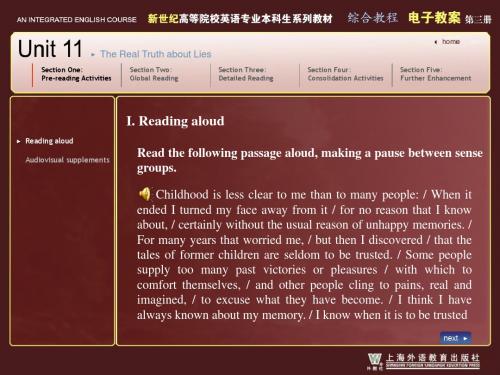
Paragraphs 12 – 15 — Paragraphs 16 – 18 —
the possibility of avoiding lies at all costs
The Real Truth about Lies
Section One: Pre-reading Activities Section Two: Global Reading Section Three: Detailed Reading Section Four: Consolidation Activities Section Five: Further Enhancement
Elle:
Reading aloud Audiovisual supplements
It’s impossible to use a half-loop top-stitching on lowviscosity rayon. It would snag the fabric. And you didn’t just get it in. I saw it in the June Vogue a year ago. So if you’re trying to sell it for full price, you picked the wrong girl. …… Girls, this is it! In a few hours, I’ll be the future Mrs. Warner Huntington III!
Questions:
1. Why didn’t Elle choose her signature color? 2. In what way did the shop assistant cheat Elle? Answers for reference: 1. Because Elle would go for an important date, in which her boyfriend would propose, and she wanted herself to be special, instead of the same as usual. 2. The dress she suggested was out of date and on sale, but she cheated Elle that it was the new one in vogue. In this way, she could get the full price of the dress.
全新版大学英语第三册-课后练习答案
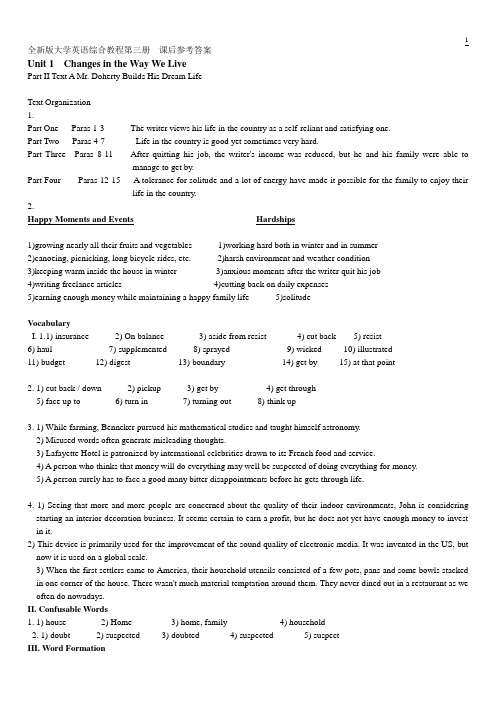
全新版大学英语综合教程第三册课后参考答案Unit 1 Changes in the Way We LivePart II Text A Mr. Doherty Builds His Dream LifeText Organization1.Part One Paras 1-3 The writer views his life in the country as a self-reliant and satisfying one.Part Two Paras 4-7 Life in the country is good yet sometimes very hard.Part Three Paras 8-11 After quitting his job, the writer's income was reduced, but he and his family were able to manage to get by.Part Four Paras 12-15 A tolerance for solitude and a lot of energy have made it possible for the family to enjoy their life in the country.2.Happy Moments and Events Hardships1)growing nearly all their fruits and vegetables 1)working hard both in winter and in summer2)canoeing, picnicking, long bicycle rides, etc. 2)harsh environment and weather condition3)keeping warm inside the house in winter 3)anxious moments after the writer quit his job4)writing freelance articles 4)cutting back on daily expenses5)earning enough money while maintaining a happy family life 5)solitudeVocabularyI. 1.1) insurance 2) On balance 3) aside from resist 4) cut back 5) resist6) haul 7) supplemented 8) sprayed 9) wicked 10) illustrated11) budget 12) digest 13) boundary 14) get by 15) at that point2. 1) cut back / down 2) pickup 3) get by 4) get through5) face up to 6) turn in 7) turning out 8) think up3. 1) While farming, Benneker pursued his mathematical studies and taught himself astronomy.2) Misused words often generate misleading thoughts.3) Lafayette Hotel is patronized by international celebrities drawn to its French food and service.4) A person who thinks that money will do everything may well be suspected of doing everything for money.5) A person surely has to face a good many bitter disappointments before he gets through life.4. 1) Seeing that more and more people are concerned about the quality of their indoor environments, John is considering starting an interior decoration business. It seems certain to earn a profit, but he does not yet have enough money to invest in it.2) This device is primarily used for the improvement of the sound quality of electronic media. It was invented in the US, but now it is used on a global scale.3) When the first settlers came to America, their household utensils consisted of a few pots, pans and some bowls stacked in one corner of the house. There wasn't much material temptation around them. They never dined out in a restaurant as we often do nowadays.II. Confusable Words1. 1) house 2) Home 3) home, family 4) household2. 1) doubt 2) suspected 3) doubted 4) suspected 5) suspectIII. Word Formation1) rise 2) final 3) regular 4) cash 5) hows, whys6) upped 7) yellowed 8)bottled 9) lower 10) searchStructure1.1) when it comes to changing your life2) when it comes to such matters as keeping the room tidy3) when it comes to emotional intelligence4) when it comes to managing minor matters2. 1) Not everyone agrees on what is right and what is wrong2) but, unfortunately, money isn't everything3) not all Americans like them4) Not all people share the same interestsComprehensive ExercisesI. Cloze(A) 1. gets by 2.temptation 3. get through 4.picked up5. improvements6.aside from7. suspect8.supplement9. profit 10.primarily 1. spraying 12. stacking(B) 1. While 2. escape 3. begin 4.Because/As 5 quit 6. start7. on 8.but (also) 9. be 10.close 11.have 12.cutting13. cook/prepare 14.cities 15.however 16.familyII. TranslationA decade ago, Nancy did what so many Americans dream about. She quit an executive position and opened / set up a household equipment store in her neighborhood. People like Nancy made the decision primarily because of/owing to/due to their desire to improve the quality of their lives.But, to run a small business is by no means an easy job. Without her steady income, Nancy had to cut back on her daily expenses. Sometimes she did not even have the money to pay the premiums for the various kinds of insurance she needed. Once she could not even pick up the phone bill and had to ask her parents to loan her some money.Fortunately, through her own hard work, she has now got through the most difficult time. She is determined to continue pursuing her vision of a better life.Part III Text BComprehension Checkl. a 2. c 3.d 4. b 5. a 6. cLanguage Practice1. In addition2. roast3. percentage4. entertainment5.cable6. at one time7. get along8. missed out on9. whip up 10. as a resultmute 12. rent 13.taken over 14. make sense 15.mushroomed16. go with 17. fried 18. dizzy 19. array 20. gaspedPart IV Theme-Related Language Learning TasksModel paperRecent Changes in Chinese Family LifeGreat changes have taken place in Chinese family life in the past twenty years. In my parents' words, the difference between their childhood and mine is as vast as that between heaven and earth.When my parents were young, there was no TV, no computers nor any other electronic appliances in their home. Their food was simple and their clothing plain. What is unbelievable to young people today is that they seldom dined out in a restaurant, or traveled to a scenic spot for a holiday.In contrast to family life one generation ago, each family in China today has at least one TV set and many have been equipped with telephones, computers, even cars. While the senior members of a family watch films on TV at home, the younger members like to play computer games or talk to their friends who may live thousands of miles from them.The changes in Chinese family life mirror the economic development of our country. Without the prosperity of the whole country, our family life would probably be just the same as before. Times have changed, and changed, most would surely agree with me, for the better.Unit Two Civil Rights HeroesPart II Text A THE FREEDOM GIVERSText Organization1.Part One Paras 1-5It is high time to honor the heroes who helped liberate slaves by forging the Underground Railroad in the early civil-rights struggles in America.Part Two Paras 6-23By citing examples the author praises the exploits of civil-rights heroes who helped slaves travel the Un-derground Railroad to freedom.2. Story 1 (Paras 6-10): After winning his own freedom from slavery, John Parker helped other slaves to escape north toCanada to get freedom.Story 2 (Paras 11-15): Supported by a strong religious conviction, the white man Levi Coffin helped black slaves toescape at huge risk to himself.Story 3 (Paras 16-23): By traveling the Underground Railroad, Josiah Henson reached his desti¬nation and became freeat last.VocabularyI. 1. 1) decades 2) historic 3) imposed 4) racial 5) slender 6) closing in on7) settlement 8) site 9) mission 10) authorized 11) terminal 12) make the best of13) exploits 14) religious 15) on the side2. 1) pass for 2) stood up for 3) laid down 4) take on 5) let (us) down 6) draw on7) come up 8) given up3. 1) The Europeans are fully confident that the Americans will not be able to justify their measures to protect thestruggling American steel industry.2)Clinton is, in the eyes of Joe Klein, staff writer of the New Yorker and author of The Natural, the most talentedpolitician of his generation and the most compelling.3) There's not much you can do if people are really intent on destroying themselves with drugs.4)A different experience of the world could forge a completely different approach to life.5) It is our conviction that cloning of human beings is bound to cause many ethical and social problems in the longrun.4. 1) As for the protection of these endangered species, many countries do not compel fishermen to report accidental capture of small cetaceans (鲸目动物) in their nets, so significant catches may go unnoticed for years. To deal with this problem, animal protectionists have forged an international alliance. On the other hand they have urged the United Nations to lay down more specific laws to save these animals.2) It was reported that food supplies would soon run out and most of the victims of the earthquake would starve to death. At huge risk, a group of volunteers from the Red Cross took on the mission to transport food, clothes and medicine to the most seriously hit areas.3) A rally was going to be held in honor of the 16th US President Abraham Lincoln who abolished slavery in 1863 and liberated the slaves in the South. In the eyes of many African-Americans, Lincoln was America's greatest president thanks to his outstanding exploits.II. Words with Multiple Meanings1.I'll tell you about my research project in a minute, but first let's hear about your French trip.2.Most McDonald's look almost the same on the outside, but actually there are about 16 different basic designs.3.Loaning money from the banks is but one of the methods we can use to get through a financial crisis.4.This second-hand car has been nothing but trouble; it's always breaking down.5.In your resume you've mentioned everything but one vital point.6.Our technicians have discovered a simple but effective solution to the problem.7.I am sorry, but I think you shouldn't have delayed your homework.8.The bankruptcy of the company was not caused by evil, but by simple ignorance.III. Usage1. lonely2. friendly3. weekly, monthly4.lovely5. cowardly6.kindly / saintly7. lively8. motherlyStructure1.1) A letter posted today will probably reach him the day after tomorrow.2)Thus encouraged, we made a still bolder plan for the next year.3)Our government has banned imports of cosmetics containing animal products from 18 countries, mostly in Europe, for fear that they could cause mad cow disease.4)Having graduated from St. Mary's College, Joyce applied to the University of California at Los Angeles.2.1) Often it is in overcoming hardships that we come to appreciate the value of life.2)Some scientists believe that people will come to like genetically modified crops someday since they can increase yieldsand farmers' incomes, reduce prices and help combat hunger and disease in the developing countries.3)With repeated hackers' attacks on our system, we have come to realize the necessity of hiring a computer-security expert.4)Having conducted some surveys in Chinese kindergartens, Howard Gardner came to understand that the Chinese preferred"teaching by holding the hand".Comprehensive ExercisesI. Cloze(A) 1. Underground 2. forged 3. stand up 4. transport 5. compelled 6. convictions7. liberating 8. mission 9. abolish 10. intent on 11. risk(B) 1. who 2. the 3.along 4. in 5.that 6. through 7.not 8. as9.referred 10. escape 11.where 12. If 13.in 14. even 15.until 16. instead 17.asII. TranslationHenson's painful life as a slave strengthened his determination to struggle for freedom. Shortly after he achieved freedom he became a member of an organization that assisted fugitive slaves. He secretly returned to the United States from Canada several times to help others to travel the Underground Railroad to freedom. Once some slave catchers closed in on the escaping slaves and Henson when they were on the run. He disguised them and successfully avoided capture. In addition, later he built a small settlement in Dresden in Canada for escaped slaves, setting up a chapel and a school where they could learn useful ways of making a living. He held to the conviction that slavery would be abolished, all the slaves would be liberated, and the day was bound to come when racial discrimination no longer existed.Part III Text BComprehension Check 1. a 2. d 3. c 4. d 5. b 6. bLanguage Practice1. remarkable2. commitment3. flourish4. resulted from5. grave6. In the midst of7. enforce8. recovery9. guarantee 10. remedy11. discriminate 12. with each passing day 13. unlike 14. subjected to15. at best 16. plays up 17. come a long way 18. do well19. against all the odds 20. In this contextPart IV Theme-Related Language Learning TasksModel paperThe Civil-Rights Movement in the U.S.Black Africans were first brought as slaves to what was to become the United States in the seventeenth century. Slavery was strongest in the South, where large plantations grew cotton, tobacco, and other crops. Towards the end of the eighteenth century, a growing demand for cotton led to an increase in the demand for slaves in the region. Slavery was less profitable in the North, however, and much of the opposition to slavery came from the northern states. The tension between the North and the South over the issue of slavery led to the Civil War in 1861.With the victory of the North, slavery was abolished. Discrimination, however, did not end. Black Americans were treated as second class citizens, especially in the South. Dissatisfaction with unfair treatment eventually led to the civil rights protests of the 1950s and 1960s that brought about government action aimed at reducing discrimination.As a result, African Americans have come a long way in the last fifty years, but they still find themselves at a disadvantage in comparison with Americans of European descent. Only 17 per cent of the black population are able to finish higher education, in contrast to 28 per cent of whites. Incomes for the average white family were just over $44,000 in 1999. For an average black family, however, the figure was in the region of $25,000. Not one of the chief executive officers of the top 500 companies is black.Anyway, the civil-rights movement in the U.S. still has a long way to go.Unit Three SecurityText A THE LAND OF THE LOCKText Organization1. 1) Doors are not left unlocked either in cities or in rural areas. Dead-bolt locks, security chains, electronic alarm systems and trip wires are widely in use.2) Suburban families have steel bars built in sliding glass doors.3) Small notices warning against burglary are commonly seen pasted on the windows of the most pleasant of homes.4) Access cards are required of those who work with medium to large-size companies.5) Airport security uses electronic X-ray equipment to guard against terrorism.6) Businessmen employ new machines linked up to their telephone to help determine whether the caller is telling lies or not.7) Suburban housewives wear rape whistles on their key chains.Vocabulary1.1) tranquil 2) analyze 3) by a small margin 4)civilize 5) rural 6)closed up7) era 8)paste 9) without so much as 10)sideways 11) barricaded 12)hook up to13) error 14)chart 15) Bathed in2. 1) bring about 2) looked back on 3) cut off 4) fit into 5) wear (the other) down 6) lies in 7) put up 8) stand for3. 1) A certain gene which is likely to make people vulnerable to asthma has been found by researchers at the Department of Clinical Medicine in Oxford.2) A wardrobe with mirrored doors had to be built in so as to make their small bedroom look larger.3) The NBC show's opening shots feature the space shuttle Challenger blowing up in January 1986—killing all seven crew.4) Colds can be held at bay by increasing your intake of fruit and vegetables which are both low in calories and rich in Vitamin C.5) Energy difficulties are a major barrier to the country's economic growth due to the fact that imported oil has absorbed 40% of its foreign exchange / because imported oil has absorbed 40% of its foreign exchange.4. 1) Jacob looked back on his summer holidays spent on the Big Island of Hawaii with itsbeautiful landscape and tranquil atmosphere as a rare escape from the madness of urban life.2) I was puzzled by the word "e-mail" when I came across it for the first time years ago. "What is an e-mail? What on earth does the letter 'e' here stand for?" I asked myself. Later, I got to know that e-mail is a system for communicating messages by electronic rather than physical means3) Mr. Smith has, over the years, established his name as a successful used-car dealer in the minds of local people. He places regular though small advertisements in newspapers fea-turing affordable second-hand cars, vans and trucks. At the back of his premises he owns a used-car lot (停车场) which faces a deserted street.II. Collocation1. away2.inside/in3. forward/through4.back5. off6.home7. back, down8.in, outIII. Usage1. Internet is not such an unusual word as it used to be.2. Most men do not look unattractive in them.3. Wealthy as she is, she is not unconcerned by her sudden unemployment.4. This claim is not unrealistic in view of a sharp decrease in the city's violent crimes.5. His poor health is not unrelated to his unhealthy way of life.Structure1.1) It never occurred to me to ask him what was intended by that remark. I thought he was just joking.2) It occurred to me that the names of their children—Rose, Lily and Daisy—were the names of flowers.3) When he heard her say so, it occurred to him that for convenience he also could contact the local travel agency and ask them to take care of everything.4) Has it never occurred to you that the problems in the Middle East are complicated and difficult to solve?2.1) If they don't agree to work extra hours for no extra pay, chances are that they will be dismissed.2) Research is being carried out on the disease and progress is being made at present. Chances are that there will be a curewithin the next ten years.3) If you are eating lots of fatty food, chances are that you'll put on several pounds in a matter of weeks.4) He left his office an hour ago but hasn't got home yet. Chances are that he's got stuck in a traffic jam. Comprehensive ExercisesI. Cloze(A)1. Statistics 2. rural 3. era 4. stood for 5. on the latch 6. vulnerable7. barriers 8. at bay 9. electronic 10. reflection 11. puzzle 12. civilized(B)1. worse / scarier 2. tougher / harder 3. Yes / True 4. barricading 5. from6. not7. every8. However9. say 10. back / at bay 11. chances 12. Therefore 13. when 14. leave 15. Don't 16. head/brainsII. TranslationA burglary is reported every 15 seconds in the United States. Statistics show burglars en-tered more than 2 million homes last year. Actually it is almost impossible to keep a determined burglar out. All you can do is discourage him for a few minutes, thus exposing him to police patrols or those wandering around. Common sense tells us that lighting is a barrier to criminal activity. A light should be fixed in the doorway and switched on at night. Believe it or not, some people, particularly children who happen to be the last to come in, leave their doors on the latch at night. Doors of hollow core, even when locked, are vulnerable to break-ins. Thus doors of solid core or steel are much preferred as they make it difficult for the burglar to pry open. If you decide to buy an alarm device, be sure to ask for its signs and put them up on both windows and doors. Finally, a word of warning—when you travel, make sure that you have a trusted neighbor collect and keep all the deliveries of newspapers and mail until you return. This is because a collection of newspapers and mail on the front doorstep or in your mailbox is an advertisement that no one is home.Part III TextBComprehension Check 1. b 2. b 3. b 4. d 5. a 6. dLanguage Practice1. impact2. inflicted3. draw the line at4. recommend5. circumstance6. break into7. take the plunge8. conclude / have concluded9. aggressive 10. confirm 11. advocated 12. insure 13. departed 14. in our favor 15. target 16. count on 17. head for 18. Under no circumstances 19. on the line 20. aimed atPart IV Theme-Related Language Learning TasksModel paper Why We Are against Gun ControlShould Americans oppose gun control? Of course we should. The gun is the great equalizer. It does not matter whetheryou are a big tough man or a small frail woman. With a gun in your hand you stand at the same height.What's more, it is the foundation of our nation. Without it there would be no Republic as it is, for we would never have been able to drive the Indians off the land without shooting so many of them down. Nor would the West have been won. Who would have dared venture into lands unpro-tected by the law if they had not been able to protect themselves with a gun? The spirit of our nation thrives on aggressive individuals who are ready to stand up for themselves and to fight for their rights. Look at our films. What do we enjoy watching? People shooting one another. True, children occasionally get hold of guns and slaughter their classmates. But if only their classmates had been properly armed, they could have fought back. It was gun control that left them defenceless.。
新编英语教程第三册Unit11

Unit 11TEXT IShaka — King of the ZulusTextShaka's military career started at about the same time as Napoleon's came to an end at Waterloo. Neither man had ever heard of the other, yet they had a surprising amount in common, particularly in their genius for war and politics. Had Shaka been born in Europe he too might well have altered the course of world affairs. As it was, he built the Zulu nation. And he would have destroyed it had it not been for the courage of a minor chieftain, Gala.When he was still only twenty-nine, Shaka seized the throne of the Zulus. It took him very little time to turn the Zulu people into a first-class fighting race because he was absolutely ruthless, never moving without an escort of "slayers", whose job it was to kill anyone who displeased him in any way. If his warriors could not run 50 miles a day, they died; if they were unable to dance barefoot on a carpet of jungle thorns, they died; if they showed anything less than suicidal courage in battle, they would be unhesitatingly murdered by the slayers. Shaka was inhuman, perhaps, but he built up a formidable army in a very short time. Shaka had already increased his kingdom from 100 square miles to 100,000 when personal tragedy struck: his mother, Nandi, died. Nandi was the one person for whom Shaka felt deep affection, and on her death something seemed to snap in his mind. What followed was unbelievable, but it was recorded by an Englishman named Flynn who was in the area at the time. Nandi was buried, and 12,000 warriors were ordered to guard her grave for a year. Then Shaka sent his impis or regiments to scour the countryside and punish all those who had failed to be present at the funeral. Only after this had been done did he announce his orders for mourning: no crops were to be planted the following year; no milk was to be used — it was to be drawn from the cow and poured on to the earth and all women who were found with child during the following year were to be put to death with their husbands. As the staple diet of the Zulus consisted of grain and milk products, this order was little less than a sentence of national starvation.Shaka now developed a brooding and bitter spirit: "I have conquered the world but lost my mother," he would cry, "and all taste has gone out of my life."After two months of intensive mourning over Nandi's death, the country was in a desperate state. The fields were overgrown with weeds and oneof the staple diets, namely milk, was no longer on the food list. Total ruin now faced the Zulu nation, and it was obvious that those who had not been killed by Shaka would certainly starve to death.Finally, one of Shaka's warriors, Gala, determined to end the tyranny. "It is enough," he told his family. "Someone must tell the Great Elephant.I shall do it. " Gala's family stared at him in horror: to challenge the King's wishes at such a moment was to ask for instant death. But Gala took his warrior's stick and went to Bulawayo to see Shaka. When he reached the right distance from the royal enclosure he shouted: "O King, you have destroyed your country. What will you reign over? Will you create a new race? Shall we all die because your mother died? You have destroyed the country. Your country will be inhabited by other kings, for your people will die of hunger. As for me, O King, I say you are dead yourself through this mother of yours. Stuff a stone into your stomach. This is not the first time anyone has died in Zululand!"Stuff a stone into your stomach! This was the Zulu way of saying: "pull yourself together". There was a gasp of horror from the onlookers, and the slayers took a grip on their clubs. That a man should dare to speak to the King in such a way was unthinkable, and Gala's life seemed to be measured in seconds. But Shaka turned to his Councillors and said: "What use are you to me? You never dared, like Gala, to tell me to stuff a stone in my stomach. Now let all men know that crops are to be planted as usual and that milk may be drunk again. And as for you," said Shaka, turning to Gala, "you shall have a mighty gift of many cattle."From an article in Look and LearnTEXT IIThe Stamping of the ThornsShaka's particular genius lay in his great personal attention to detail and in his capacity for hard work. If at all possible, he always insisted on inspecting everything himself, and he invariably checked all reports by getting evidence from as many sources as possible. He was a firm believer in the saying: "It is the master's eye which makes the cow grow fat."Two months after becoming king, Shaka called all his "regiments" together. His combined fighting forces totalled only about 500 men. He told them of the virtues of the short, heavy stabbing spear or assegai which he himself had designed to replace the light throwing one used in the past by the Zulu fighters. As he expected, the younger soldiers took up the new assegai with enthusiasm, soon to be followed by the older men. Next Shaka ordered all his regiments to throw away their sandals. There was considerable protest at this, especially from the older groups, buthe pointed to his own bare feet and even ran a race to prove that he was faster than any of his men wearing sandals.A month later, Shaka noticed that there was still a lot of dissatisfaction and grumbling about his order that sandals should no longer be worn. So, he told one of his regiments to collect many basketfuls of the sharp "devil thorns". These thorns have three spikes, one of which always points upwards when they lie on the ground.When enough of these thorns had been collected, Shaka ordered them to be spread over the parade ground. All his regiments were then ordered to parade a little to the side of the ground covered with thorns. Shaka then addressed them: "It has come to my ears," he said, "that some of you have soft feet, and this has made me very sad. So I have decided to help you harden them!"Shaka then ordered his men to stamp the thorns into the ground with their bare feet. Anyone who hesitated or did not stamp hard enough was to be killed at once by his "slayers".The regiments gritted their teeth and, led by Shaka himself, spread over the parade ground. Shaka turned to face them and the stamping began. Shaka's feet, however, were horny and impervious. He felt nothing; but his eagle eye at once picked out those who were hesitant. These men were told to stand forward and were then clubbed to death by the slayers. And so he went on, searching up and down the lines, but after half a dozen examples had been made all the soldiers stamped as hard as they could. When Shaka was satisfied that the thorns had been stamped out of sight he told his men they could go. That evening they were given a great feast at which they could eat and drink as much as they liked.From Shaka Zulu by E. A. Ritter。
综合英语教程第三册11单元3-11-Part 1

Reference Answers
1. Why won’t Jane work in China after she finishes her study? She has been unable to find a job that suits her. As she is studying Chinese medicine, she thinks that it may perhaps be easier for her to open a Chinese clinic in the United States. 2. How does Jane feel about the future of China? She thinks that China is developing very rapidly and that China's modernization will become a reality very soon.
Book 3-Unit 11
Mr. Wang is a friend of Jane. He is pessimistic somewhat ___________ and _________ about uncertain his future. He is a person who lives _____________. To him, ______ doesn’t mean in the present future vague too much. It’s ______.
Book 3-Unit 11
Pre-listening questions: What’s your plan for your future? Discuss the meaning of the following terms: reckon: think, suppose Chinese medicine: traditional method of treating Chinese herbs:中草药 update: to make more modern
晨梅梅《新发展英语综合教程(3)》学习指南【词汇短语+课文精解+全文翻译+练习答案】(Unit 11
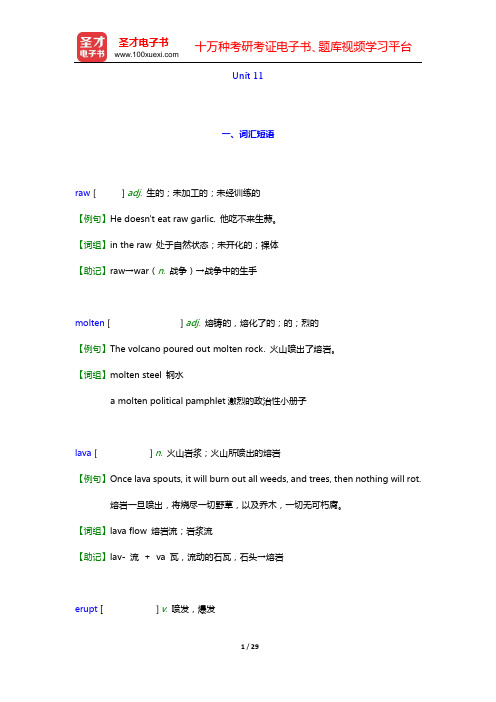
2 / 29
圣才电子书 十万种考研考证电子书、题库视频学习平台
车。 【词组】depend on依靠;依赖;视…而定,决定于
in fashion合于时尚,流行
surmise
v. & n. 猜测,猜度
【例句】We surmised that he must have had an accident. 我们猜想他一定出事了。
圣才电子书
十万种考研考证电子书、题库视频学习平台
Unit 11
一、词汇短语
raw
adj. 生的;未加工的;未经训练的
【例句】He doesn't eat raw garlic. 他吃不来生蒜。
【词组】in the raw 处于自然状态;未开化的;裸体
【助记】raw→war(n. 战争)→战争中的生手
in a stew 烦恼;着急
【派生】stewed adj. 焦虑不安的;烂醉的;炖4 / 29
pan [
圣才电子书 十万种考研考证电子书、题库视频学习平台
n. 平底锅,盘子
【例句】She fried the eggs in a frying pan. 她在平锅里煎鸡蛋。 【词组】flash in the pan 昙花一现;淘金盆里的反光(形容空欢喜一场,好景不长) 【助记】拼:盘,长得象平底锅-用平底锅打你一下-严厉批评
molten
adj. 熔铸的,熔化了的;的;烈的
【例句】The volcano poured out molten rock. 火山喷出了熔岩。
【词组】molten steel 钢水
a molten political pamphlet 激烈的政治性小册子
lava
全新版大学英语综合教程第三册 Unit 3PPT课件
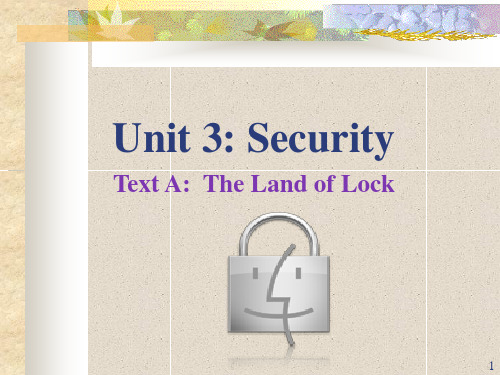
6
II. Various kinds of security devices: 1) Dead-bolt locks, security chains, electro-nic
2
Greene's frequent ink-stained trips to the past tell us that though we've gained much as time has marched forward, we have lost much as well. We have lost, as Greene emphasizes, our inability to escape the technology that aids us. This test “The Land of The Lock” is just a good example of his works.
5
I. Text Organization Part 1: Paras. 1-3:
In America the era of leaving the front door on the latch at night is over. Part 2: Paras. 4-15:
A new atmosphere of fear and distrust creeps into every aspect of daily life. As a result, security devices, in varied forms, are put to use. Part 3: Paras. 16-end:
全新版大学英语综合教程第三册课件 Unit 3
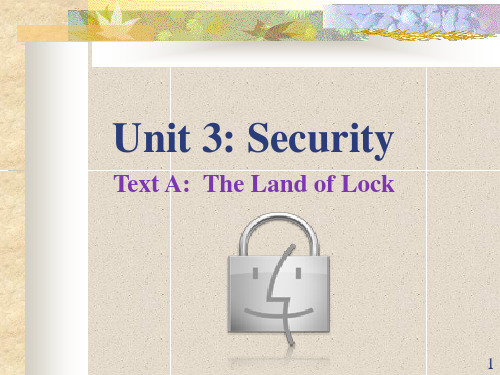
10
The writer has still cleverer devices at hand, like a subtle tense change (e.g. simple past in Para. 1 vs. present perfect in Para. 4), a phrase that indicate an old habit in contrast with a phrase indicating the current state (i.e. “used to” vs. “no longer” in Para. 11), or a summary sentence ( It wasn’t always like that” in Para.12).
8
III. Features of Writing in the text 1. When we read, we are not only learning new vocabulary or structure, but also looking for key information. Identifying keywords is even more important if our reading time is not that plentiful. “Lock” is the keyword in this text, by locating “lock’s” throughout the text, we get a pretty good idea of what this essay is about.
15
7. at any rate: in any case; whatever happens --At any rate, orders must be obeyed. -- At any rate, the task must be fulfilled
Unit 11 On Becoming a Better Student Words and Expressions综合教程三
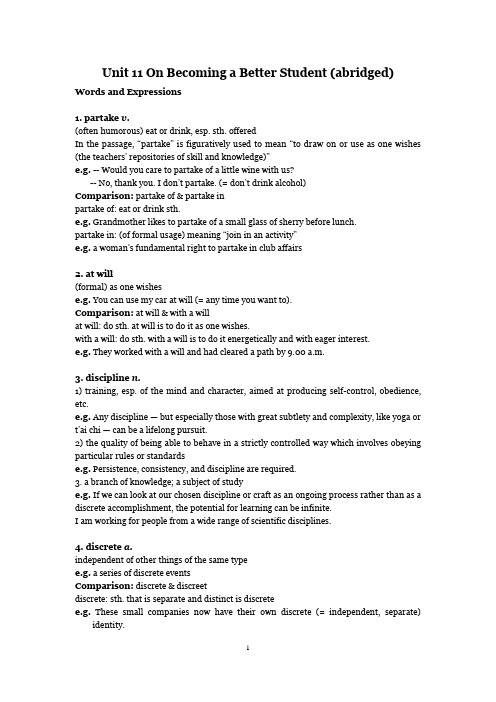
Unit 11 On Becoming a Better Student (abridged) Words and Expressions1. partake v.(often humorous) eat or drink, esp. sth. offeredIn the passage, “partake” is figuratively used to mean “to draw on or use as one wishes (the teachers’ repositories of skill and knowledge)”e.g. -- Would you care to partake of a little wine with us?-- No, thank you. I don’t partake. (= don’t drink alcohol)Comparison: partake of & partake inpartake of: eat or drink sth.e.g. Grandmother likes to partake of a small glass of sherry before lunch.partake in: (of formal usage) meaning “join in an activity”e.g. a woman's fundamental right to partake in club affairs2. at will(formal) as one wishese.g. You can use my car at will (= any time you want to).Comparison: at will & with a willat will: do sth. at will is to do it as one wishes.with a will: do sth. with a will is to do it energetically and with eager interest.e.g. They worked with a will and had cleared a path by 9.00 a.m.3. discipline n.1) training, esp. of the mind and character, aimed at producing self-control, obedience, etc.e.g. Any discipline — but especially those with great subtlety and complexity, like yoga or t’ai chi— can be a lifelong pursuit.2) the quality of being able to behave in a strictly controlled way which involves obeying particular rules or standardse.g. Persistence, consistency, and discipline are required.3. a branch of knowledge; a subject of studye.g. If we can look at our chosen discipline or craft as an ongoing process rather than as a discrete accomplishment, the potential for learning can be infinite.I am working for people from a wide range of scientific disciplines.4. discrete a.independent of other things of the same typee.g. a series of discrete eventsComparison: discrete & discreetdiscrete: sth. that is separate and distinct is discretee.g.These small companies now have their own discrete (= independent, separate)identity.discreet: sb. who is discreet is careful or showing good judgment in what one says or does; sth. that is discreet is not too obviouse.g. We must be extremely discreet (= careful in what we do and say); the police suspectsomething.5. live up tobehave in accordance with (what is expected); achieve or keep (high standards)e.g. You disappointed us by failing to live up to your principles.Practice:他认为很难按自己的理想办事。
全新版大学英语综合教程3完全版.pdf
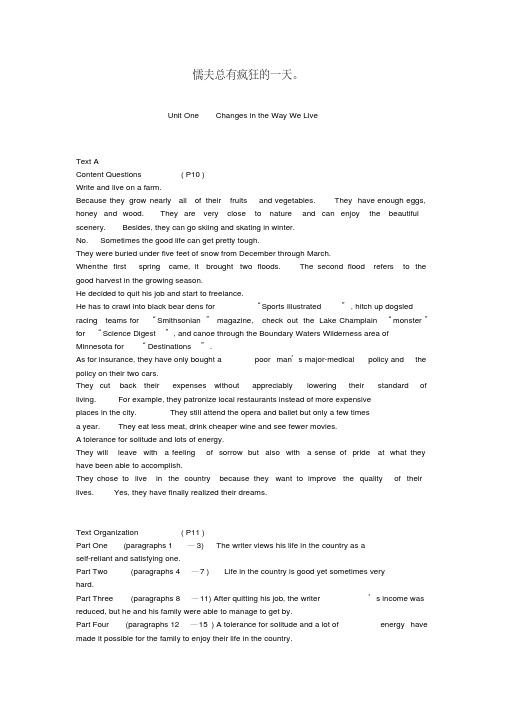
懦夫总有疯狂的一天。
Unit One Changes in the Way We LiveText AContent Questions ( P10 )Write and live on a farm.Because they grow nearly all of their fruits and vegetables. They have enough eggs, honey and wood. They are very close to nature and can enjoy the beautiful scenery. Besides, they can go skiing and skating in winter.No. Sometimes the good life can get pretty tough.They were buried under five feet of snow from December through March.When t he first spring came, it brought two floods. The second flood refers to the good harvest in the growing season.He decided to quit his job and start to freelance.He has to crawl into black bear dens for “Sports Illustrated”, hitch up dogsled racing teams for “Smithsonian” magazine, check out the Lake Champlain “monster”for “Science Digest”, and canoe through the Boundary Waters Wilderness area of Minnesota for “Destinations”.As for insurance, they have only bought a poor man’s major-medical policy and the policy on their two cars.They cut back their expenses without appreciably lowering their standard of living. For example, they patronize local restaurants instead of more expensiveplaces in the city. They still attend the opera and ballet but only a few timesa year. They eat less meat, drink cheaper wine and see fewer movies.A tolerance for solitude and lots of energy.They will leave with a feeling of sorrow but also with a sense of pride at what they have been able to accomplish.They chose to live in the country because they want to improve the quality of their lives. Yes, they have finally realized their dreams.Text Organization ( P11 )Part One (paragraphs 1—3) The writer views his life in the country as aself-reliant and satisfying one.Part Two (paragraphs 4—7 ) Life in the country is good yet sometimes veryhard.Part Three (paragraphs 8—11) After quitting his job, the writer’s income was reduced, but he and his family were able to manage to get by.Part Four (paragraphs 12—15 ) A tolerance for solitude and a lot of energy have made it possible for the family to enjoy their life in the country.Happy Moments and Events1) growing nearly all their fruits and vegetables2) canoeing, picnicking, long bicycle rides, etc.3) keeping warm inside the house in winter4) writing freelance articles5) earning enough money while maintaining a happy family lifeHardships1) working hard both in winter and in summer2) harsh environment and weather condition3) anxious moments after the writer quit his job4) cutting back on daily expenses5) solitudeVocabulary1. Fill in the gaps with words or phrases given in the box. ( P15 )1) on balance 2) resist 3) haul 4) wicked5) illustrated 6) budget 7) lowering 8) boundary9) involved 10)economic 11) blasting 12) just about2. Now u se the verb in brackets to form an appropriate phrasal verb you have learned and complete the sentence with it. ( P16 )1) cut back / down 2)pick up3)get by 4) get through5)face up to 6)turn in7)making up for 8)think up3. Rewrite each sentence with the word or phrase in brackets, keeping the same meaning. (P17 )1) pursued his mathematical studies and taught himself astronomy.2) often generate misleading thoughts.3) attach great importance to combining theory with practice in our work.4) be suspected of doing everything for money.5) before he gets through life.4. Complete the sentences, using the words or phrases in brackets ( P17 )1. their indoor a profit to invest in2. device the improvement on a global scale3.stacked temptationnever dined outConfusable Use ( P18 )househomehome familyhouseholddoubtsuspecteddoubtedsuspectedsuspectWord Formation ( P19 )1) rise 2) final 3) regular 4) cash 5) hows and whys6) upped 7) yellowed 8) bottled 9) lower 10) searchCloze1. Text-related ( P20 )1) gets by 2) temptation 3) get through4) improvement 5) aside from 6) suspect7) supplement 8) profit 9) stacking2. Theme-related ( P21 )1) replaced 2) consider 3) quit4) world 5) tough 6) fuels7) provide 8) luxuries 9) balance10) idealTranslation1. Translate the sentences into English ( P21 )1) We have a problem with the computer system, but I think it is fairlyminor.2) My father died when I was too young to live on my own. The people of my hometown took over responsibility for my upbringing at that point.3) the toys have to meet strict safety requirements before they can besold to children.4) Radio and television have supplemented rather than replaced the newspaper as carriers of new and opinion.5) When it comes to this magazine, it is a digest of articles from manynewspapers and magazines around the world.2. Translate the passage into English ( P21 )A decade ago, Nancy did what so many A mericans dream about. She quit an executive position and opened a household device store in her neighborhood. People like Nancy made the decision primarily for the improvementin the quality of their lives.But, to run a business on a small scale is by no means an easy job. Without her steady income, Nancy had to cut back on her daily expenses. Sometimes she did not even have the money to pay the premiums for thevarious kinds of insurance she needed.Fortunately, through her own hard work, she has now got through themost difficult time. She is determined to continue pursuing her vision of a better life.Text B1. Choose the best answer for each of the following. ( P27 )1—6. a c d b a cTranslate into Chinese the underlined sentences in the essay ( P28 )什么你说那听起来不像你府上的生活其实,不仅仅是你一个人这么想。
- 1、下载文档前请自行甄别文档内容的完整性,平台不提供额外的编辑、内容补充、找答案等附加服务。
- 2、"仅部分预览"的文档,不可在线预览部分如存在完整性等问题,可反馈申请退款(可完整预览的文档不适用该条件!)。
- 3、如文档侵犯您的权益,请联系客服反馈,我们会尽快为您处理(人工客服工作时间:9:00-18:30)。
Book 3-Unit 11
Extended Activities
Dictation Read More Grammar and Vocabulary Translation Raise Questions Writing Cultural Information
Read A Glimpse of the Future on page160, and discuss:
1. What do you plan for your future? 2. Can you feel the responsibilities this society places on you? What are they?
Book 3-Unit 11
F FΒιβλιοθήκη F T T6. Lisa thought highly of Jude the Obscure written by Thomas Hardy. 7. There seemed to be two purposes for the interview, one was to find out how students spent their non-school time, the other was to find out about their views of the meaning of life. 8. The three girls were all engrossed in the question about their future. 9. The girls thought that Edwin Shaw was oldfashioned and he asked silly questions. 10. It can be inferred from the interview that Edwin Shaw had some worries about the future of Britain.
Book 3-Unit 11
Vocabulary Work: Collocation
Look at the following table and tick the possible collocations of verbs and noun phrases.
reach an ambition a dream an agreement an obligation a target a compromise attain secure realize fulfill achieve
Book 3-Unit 11
Grammar: Post-modification Vocabulary: Collocations
Book 3-Unit 11
Post-modification
Study the following examples and see how they are expanded from a noun phrase. 1. His father placed him at the entrance of the two roads—one leading to a peaceful sunny place covered with flowers, fruits and resounding with soft sweet songs, the other … 2. The other two break into laughter as if she had said something clever.
Return to Menu Book 3-Unit 11
Today I met George in the supermarket for the first time after thirty years. We were close friends in primary school, but I dared not greet him because I was not sure whether he would recall our friendship after so many years. The thing that struck me was my own reaction to meeting him. From day to day I often see men who went to school with me and who have, in the common way of speaking, done well for themselves. They are now doctors, lawyers, important officials and even very successful businessmen. They are wealthy and famous figures in our city. Sometimes, they see me too and nod a greeting or turn their eyes to a shop window as the case may be. Whenever I encounter one of these people I always feel a burning shame and self-contempt, but George was different because we were special friends. I used to protect him from the bullies around our school. He noticed me and our eyes met, but he soon noticed the worn, old clothes I was wearing. He greeted me warm-heartedly from a distance and said quickly Script afterwards: "Billy, nice to see you, but I must run." I can't understand why I replied "Yes, Sir." Book 3-Unit 11
Book 3-Unit 11
Finish Exercise 3b, check your answers. 1. people present 2. present situation 3. a story much funnier than that 4. president elect 5. secretary-general 6. person responsible 7. responsible manner 8. city proper 9. nothing interesting
Book 3-Unit 11
Book 3-Unit 11
Key to Translation
(page 163)
1. There is a road on our left leading straight to the foot of the mountains. 2. In order to lose weight, she eats nothing but vegetables. 3. We are sorry to inform you that we cannot employ you right now. If there is a position vacant/a vacancy in the future, we will contact you.
a. Post modification by v. ed / v.ing b. Post-modification by adj.
Book 3-Unit 11
Post modification in set phrases/idiomatic usage e.g. the secretary-general (more dignified than The General Secretary); president-elect (not in office yet); the city proper (downtown area)
Book 3-Unit 11
confronting 5. There are a lot of problems that confront us at the moment. 6. I've just said the most stupid thingImaginable. that you can imagine. 7. Tagalog is one of the languages that spoken are spoken in the Philippines. 8. Most of the people who strolled in the park were strolling teenagers.
Book 3-Unit 11
Read the story and do the True/False/Not mentioned exercise on page 161. T 1. The author interviewed Lisa, Tina and Cheryl NM NM F T
because they were ordinary teenagers. 2. Teenagers in Britain were not allowed to go to pubs and discos. 3. While Lisa was quite tall, Tina and Cheryl are of medium height. 4. All three girls were hard-working students who liked to read books in their spare time. 5. The girls cherished privacy. They refused to answer the questions regarding boyfriends.
